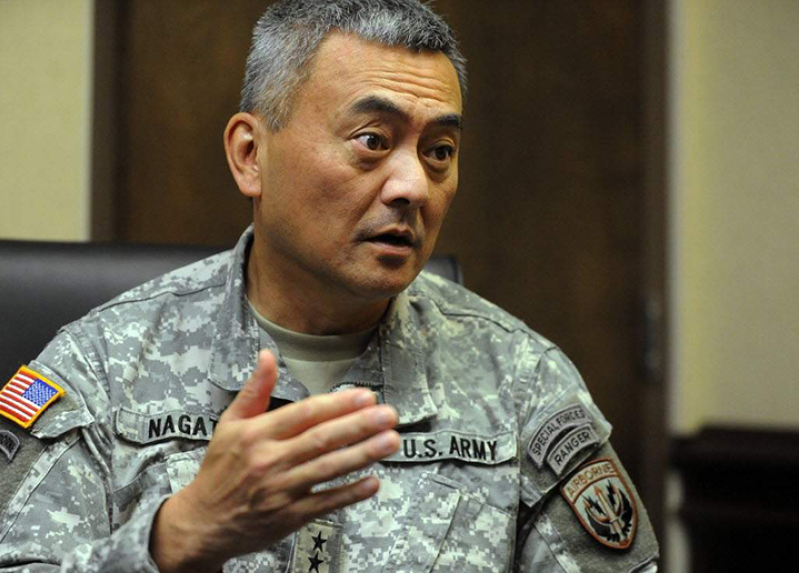
The United States military is trying to figure out how to fight the Islamic State, widely known as ISIS, and effectively counter threats and propaganda from the radical Islamic group.
According to Eric Schmitt of the New York Times, Maj. Gen. Michael K. Nagata, commander of American Special Operations forces in the Middle East, wanted to know what made ISIS such a deadly threat. The special operations general first held a series of confidential conference calls with experts outside the U.S. government back in August to gather ideas on how to tackle the complex enemy, which is both a hybrid terrorist organization and conventional army.
"We have to remember that most of their messaging is not for us," Nagata said. "We are not the target. They are happy to see us outraged, but they are really communicating to people we are being drawn to their banner."
Schmitt noted that the general's frustration is shared by other American officials.
"We do not understand the movement, and until we do, we are not going to defeat it," the general said. "We have not defeated the idea. We do not even understand the idea."
Although President Barack Obama expressed growing confidence that ISIS can be beaten back through airstrikes in Iraq and Syria, there are some within the U.S. government who acknowledged that the efforts barely made a dent to kill off the ideology that drives ISIS militants.
"What makes I.S. so magnetic, inspirational?" Nagata asked. "There is a magnetic attraction to I.S. that is bringing in resources, talent, weapons, etc., to thicken, harden, embolden I.S. in ways that are very alarming."
The three dozen experts involved in the conference call told Nagata on how ISIS had the "capacity to control" a population. According to the New York Times, the experts focused on the intangible methods ISIS used to show control over an area, which included "psychological tactics such as terrorizing populations, religious and sectarian narratives," and "economic controls."
However, the experts may have found a weakness in the Islamic extremist organization's strategy. They also questioned whether or not ISIS had "the bureaucratic sophistication necessary to govern."
Despite the findings, Nagata also expressed concern that ISIS is "deeply resonant with a specific but large portion of the Islamic population, particularly young men looking for a banner to flock to." According to Schmitt, the general alluded to the terrorist organization's sophisticated use of social media that has bolstered its propaganda efforts.
"I want to engage in a long-term conversation to understand a commonly held view of the psychological, emotional and cultural power of I.S. in terms of a diversity of audiences," Nagata said. "They are drawing people to them in droves. There are I.S. T-shirts and mugs."
The general insisted that the United States had to figure out how to combat the problem by recruiting "people born and raised in the region."
"When I watch Americans use words like cowardly, barbaric, murder, outrageous, shocking, etc., to describe a violent extremist organization's actions, we are playing right into the enemy's hands," Nagata added. "They want us to become emotional. They revel in being called murderers when the words are coming from an apostate."
According to Colleen Curry of VICE News, the confidential (but not classified) conference call offered a glimpse into how the military is struggling to catch up with the new threat. Patrick Skinner, director of special projects for the Soufan Group, thought it was a good step for the U.S. military to ask these types of questions.
"We have to question everything - what are we doing, is it working, and even before that, what does it mean to succeed, what does that look like?" Skinner said. "We have to look at the psychology of ISIS and we're studying them, but also the psychology of the region, and of us. What does success look like and is it achievable?"
Skinner added that while the U.S. military has been quite successful in taking out another military's operations, it could improve its efforts on fixing the problems that allowed ISIS to form in the first place.
"We're the world's medic," Skinner said in regards to U.S. military capabilities. "We can stop the bleeding, but we need a doctor to cure the patient, and we can't do that with strikes."
According to the New York Times, the general brushed off criticism from those questioning his decision to focus on the "intangibles of ISIS."
"What we have been asked to do will take every ounce of creativity that we have," Nagata said. "This may sound like a bizarre excursion into the surreal, but for me it is about avoiding failure."







